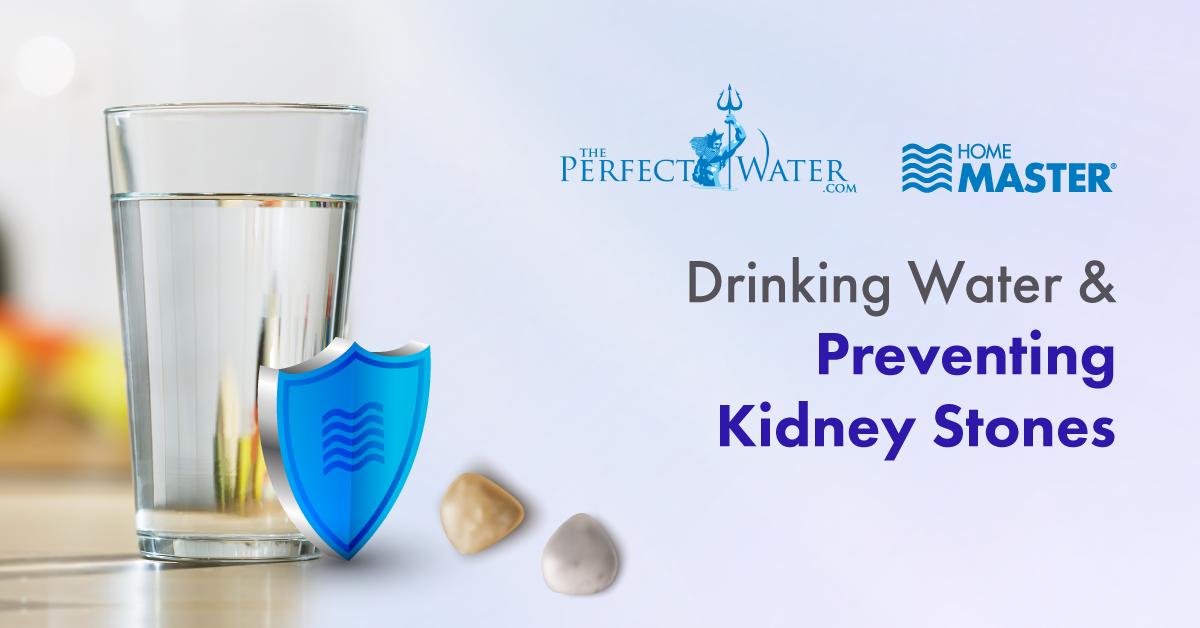Drinking Water & Preventing Kidney Stones

Kidney stones are becoming common in the US, and recent research by Kidney.org states that one in ten individuals develop kidney stones in their lifetime. If we look closely into this, there can be several reasons that lead to the condition of kidney stones in an individual. Dehydration or excessive loss of fluid due to sweating is one of the causes that form calcium oxalate crystals in kidneys, ultimately converting into kidney stones.
Moreover, even if you have had a personal history or family history of kidney stones, you can develop kidney stones further. Harvard Health states that about half of the people who have had kidney stones once, strike again within seven years without preventive measures.
Being mindful of your hydration and the quality of your drinking water is the first step toward prevention of the kidney stones. Purified water decreases the risk of calcium-citrate and calcium-oxalate buildup in your body, thus decreasing your risk of kidney stones. Kidney stones have many causes and are not only due to water quality. However, studies have shown a significant risk when consuming hard water. This guide will throw some light on types of kidney stones, their causes, prevention practices, and more. Let us start by understanding the scenario of kidney stones in humans.
What is The Current Scenario?
Hard water is water with dissolved calcium and magnesium above established defined levels - typically 10 grains per gallon or 171 mg/L. Most city and well water supplies contain some calcium and magnesium because their source is groundwater. Groundwater is water that accumulates at a certain depth underground. Since limestone is so common, groundwater in most of the United States will pick up calcium and magnesium from the limestone. Many municipal water supplies and wells draw from groundwater, but the hard water minerals usually don’t get removed unless a home or workspace has a water softener or reverse osmosis system.
As per NLM, kidney stone issues are on the rise, affecting about 12% of the world's population, with a yearly incidence of 600,000 in America. While anyone can have kidney stones, the lifetime risk of kidney stones is about 19% in men and 9% in women.
Symptoms & Types of Kidney Stones
Kidney stones can lead to severe complications related to gastrointestinal diseases in the later stages if left untreated. There are several underlying health conditions that can trigger the risk of kidney stones, such as repetitive UTI occurrence, history of intestinal surgery, lack of hydration or drinking contaminated water, improper diet intake, and so on. The affected individuals can experience multiple symptoms, such as:
- Painful urination
- Frequent or urgent urination
- Foul-smelling urine
- Cloudy urine
- Difficulty urinating
- Fever
- Chills
- Sweating
Kidney stones are usually diagnosed via a high-resolution CT scan from the kidneys down to the bladder, or an x-ray called a "KUB x-ray'' (kidney-ureter-bladder x-ray) which will show the size of the stone and its position. Getting an understanding of the different types of kidney stones and their likely causes can lead to better prevention and cure:
1. Calcium oxalate
The envelope or dumbbell-shaped calcium stones are the most prevalent ones and commonly form calcium oxalate. Your body can get oxalates from two sources - produced by the liver daily and other dietary sources. Moreover, they can also occur due to high dosages of vitamin D supplements, intestinal bypass surgeries, and other metabolic disorders.
2. Calcium phosphate
You can identify calcium phosphate stones if they exhibit amorphous, wedge-shaped prisms in a rosette shape. These occur due to the medications required to treat migraines or seizures and other common metabolic conditions like renal tubular acidosis.
3. Struvite
The coffin lid-shaped struvite stones, or magnesium ammonium phosphate stones, form in response to urinary tract infections where the bacteria produce more urease. Struvite stones tend to grow quickly with no or fewer symptom indications. If you consume hard water on a daily basis, struvite stones can be a common occurrence in your kidneys. The key is to use a reverse osmosis drinking water system to remove the hardness.
4. Uric acid
Uric acid stones are usually rhomboid shaped and form mostly when an individual has a higher protein intake, suffers from chronic diarrhea or malabsorption, and has diabetes or metabolic syndrome.
5. Cystine
The hexagon-shaped cystine stones stem from a hereditary disorder called cystinuria, wherein your kidneys produce abnormal amounts of amino acids.
The reasons that form kidney stones are many, but the at-home remedy or precautionary measure one can take is to get proper hydration and double-check the purity of the water. Drinking contaminants-free water not only reduces the risk of kidney stones, but it can also help you with living a healthy life. Here are a few suggestions that can benefit you in treating kidney stones or keep you away from getting one.
Dietary Suggestions For Kidney Stones
For people who have been diagnosed with kidney stones, here are a few dietary intakes to avoid:
For Calcium stones - Limit salty foods like cheese, frozen food, meat, canned soups & vegetables, pickles, etc.
For Oxalate stones - Reduce foods with high oxalate levels, such as spinach, rhubarb, and almonds.
For Uric Acid stones - Reduce your intake of red meat and shellfish.
Install an RO water purifier for a better water drinking experience. RO systems will enhance your drinking water’s quality and work well if you are diagnosed with kidney stones. If left untreated, kidney stones can also lead to a possibility of chronic kidney disease, as per the Washington Post. As per the study, over 37 million people — more than 1 in 7 — in the United States have chronic kidney disease (CKD). What is concerning is that 9 out of 10 individuals do not know that they have CKD. Now that you have a clear idea about the types of kidney stones and their causes, let’s understand how to prevent their occurrence.
Hydration and Kidney Health/ Kidney Stone Prevention
In order to experience the downstream effect of reducing your risk of kidney stones, the first step is to implement dietary and lifestyle changes. There have been significant improvements in the individuals who adopted a vegan and plant-based diet. Similarly, physical exercise has also helped individuals maintain and improve their kidney health.
Urology Care Foundation states that half of those individuals with kidney stones are more likely to develop another one. Begin with monitoring your water intake. You can find hydration reminders in your device’s app store. Consistent water intake of up to 2 to 2.5 liters per day can help you flush out the kidney stones effectively, as suggested by Dr. Monica Morgan, a urologist at Houston Methodist.
Proper, regular hydration is essential not just to prevent kidney stones but also because your body loses water through sweat and urine throughout the day. Unfortunately, most of us miss out on drinking water at regular intervals every day and become dehydrated due to hot weather, peak activity levels, work, stress, exercise, and more. In order to reduce the risk of kidney stones, avoid drinking hard water as it can only worsen the condition and likely increase the chances by 300%.
Precautionary Measures To Prevent Kidney Stones
Kidney Stones can be prevented or significantly controlled if you take action. Kidney stones can lead to major health concerns related to chronic kidney diseases, end-stage renal failure, cardiovascular diseases, diabetes, and hypertension. If you exhibit any sign of kidney stones, it is advisable to see a urologist. Usually, they can detect the stones via imaging, blood, and urine tests to evaluate your condition.
Drinking purified water is a primary step to preventing kidney stones from forming. Increased water intake, mandatorily, contaminant-free drinking water, helps flush out toxins - which is the first step toward kidney health. If you haven’t installed an RO water filter system in your house, now is the time. Let’s look at some other precautionary measures that can help you enhance your water intake and prevent kidney stones:
- Add flavors to your water and make it more exciting to consume. Ensure these are not artificial flavors and use natural ingredients like cucumbers, mint, lemon, lime, or orange.
- Drink lukewarm water with honey and lemon during winter; it can also help you with digestion.
- If you find it monotonous, try citrus drinks like lemonade and orange juice that help prevent crystals from turning into kidney stones.
- Sugary drinks can be unhealthy. Switch to sparkling water instead of drinking soda.
- Try a hydration reminder app that helps track your daily water consumption and set reminders to drink a glass of water every hour.
- Get authoritative government bodies to check contamination in your drinking water and ensure the levels are within the stipulated amount as per EPA.
- Install efficient RO water filters and RO water systems that prevent harmful toxins from entering your body via water to avoid stone formation in your kidneys via contaminated water.
Conclusion
Kidney stones are painful, dangerous, and commonplace, but preventable/treatable. They have become an underlying cause of many gastrointestinal diseases and stress in a few individuals. Water intake is closely associated with preventing and curing this issue, which is why trusted RO water systems can help. We at Home Master® offer reliable and long-lasting water purification solutions. Get in touch with us for more information.





